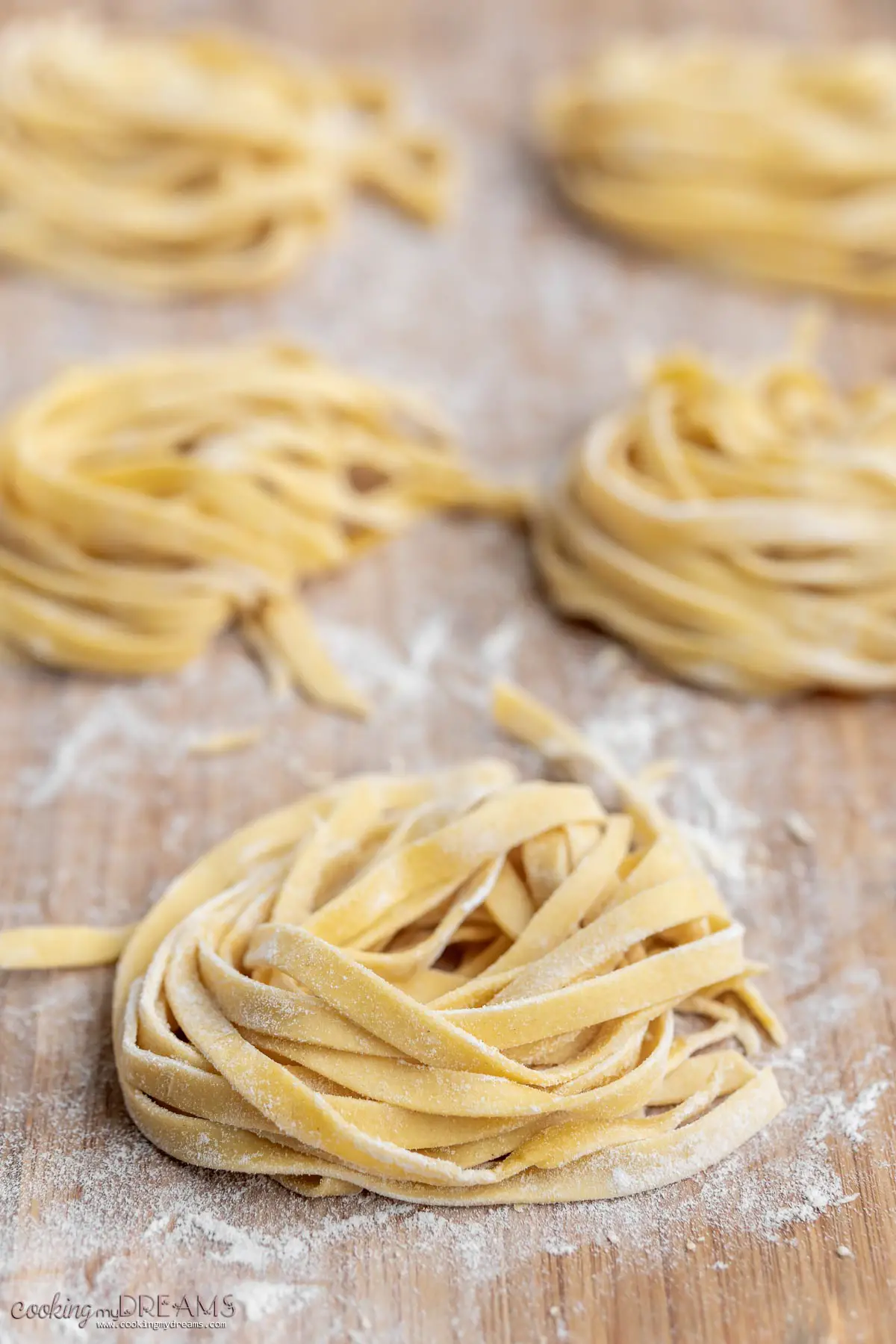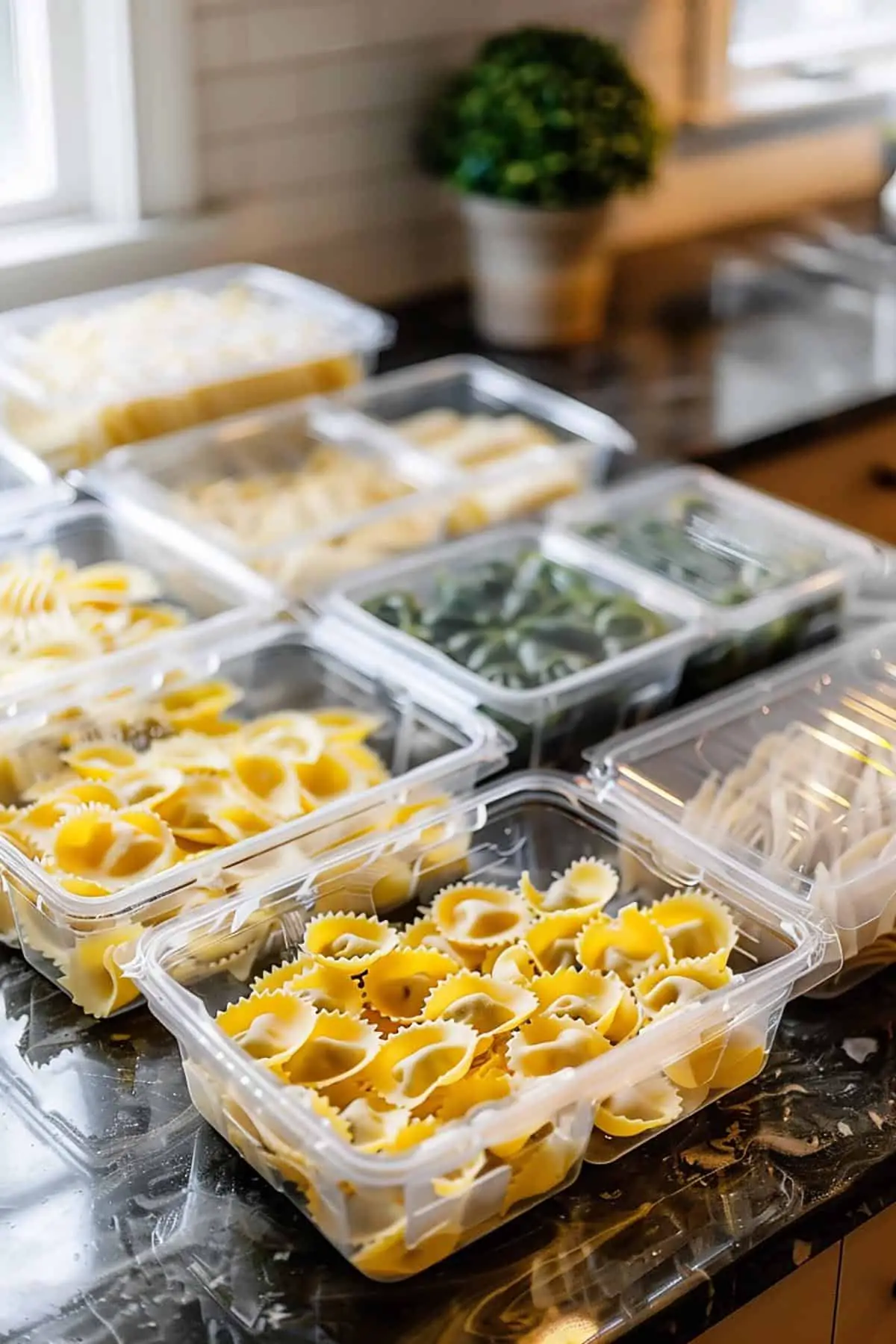If you're a pasta lover, you know that nothing beats the taste of fresh pasta. Whether you make it yourself or buy it from a local shop, fresh pasta has a unique texture and flavor that is hard to resist. However, what do you do when you have leftover fresh pasta that you can't finish? Can you freeze pasta? How do you cook it after it's been frozen? In this article, we will answer these questions and more, so you can enjoy fresh pasta whenever you want.

Freezing fresh pasta is a great way to save time and reduce waste. However, it's important to do it correctly to ensure that the pasta retains its texture and flavor. This way, you could make large batches of fresh pasta and then freeze it in portions to have ready whenever you crave a good plate of homemade pasta or when you have guests for dinner. It will be just as good as freshly made!
Cooking fresh pasta that has been frozen is super easy and it will not alter the taste and consistency of the pasta. You can also cook frozen pasta directly in a saucepan with your favorite sauce for a quick and easy meal. With these tips, you can freeze and cook fresh pasta with confidence and enjoy it anytime you want.
If you're looking for more guides on fresh pasta, check out this article on how to make 10 different pasta shapes without a pasta machine, and this guide on how to make perfect ravioli.
Jump to:
💭 Benefits of Freezing Fresh Pasta
Freezing fresh pasta is a great way to preserve it for future use. It is a convenient option for busy home cooks who want to enjoy fresh pasta without the hassle of making it from scratch every time. Here are some of the benefits of freezing fresh pasta:
- Preserves freshness: Freezing fresh pasta helps to preserve its freshness and flavor. Fresh pasta has a short shelf life and can only be stored in the refrigerator for a few days. Freezing fresh pasta can extend its shelf life for up to six months.
- Saves time: Freezing fresh pasta can save you time in the kitchen. Instead of making fresh pasta every time you want to enjoy it, you can simply take it out of the freezer and cook it. This is especially useful for busy weeknights when you don't have a lot of time to cook.
- Maintains quality: Freezing fresh pasta does not compromise its quality. When cooked properly, frozen fresh pasta tastes just as good as freshly made pasta. However, it is important to follow the correct cooking instructions to avoid overcooking or undercooking the pasta.
- Reduces waste: Freezing fresh pasta is a great way to reduce food waste. If you have leftover fresh pasta that you can't finish, you can freeze it and enjoy it later. This is a great way to save money and reduce your environmental impact.
With the right storage and cooking techniques, you can enjoy delicious and fresh-tasting pasta from the freezer in no time.
🔪 Preparing Pasta for Freezing
When it comes to freezing fresh pasta, proper preparation is key. Here are some tips to help you prepare your pasta for freezing:
- Drying Pasta Before Freezing: Before you freeze your fresh pasta, it's important to dry it out a bit first. This helps to remove excess moisture from the pasta, which can cause it to stick together when frozen. To dry your pasta, simply lay it out on a clean towel or drying rack and allow it to air out for at least 30 minutes, up to a few hours. You can also use a fan to help speed up the drying process.
- Using Parchment Paper and Baking Sheets: To prevent your fresh pasta from sticking together when frozen, it's a good idea to use parchment paper and baking sheets. Simply lay out your pasta on a sheet of parchment paper and place it in the freezer for about 1 hour. Once the pasta is frozen, you can transfer it to a freezer bag or container for long-term storage.
- Portioning Pasta for Storage: When freezing fresh pasta, it's important to portion it out properly to make it easier to use later on. You can either freeze your pasta in individual portions or in larger batches. If you choose to freeze your pasta in individual portions, simply divide it up into the desired serving sizes and place them in separate freezer bags. This makes it easy to grab just the right amount of pasta when you need it. If you prefer to freeze your pasta in larger batches, you can use a larger freezer bag or container. Just be sure to label it with the date and contents so you know what's inside.
⏲️ Freezing Techniques for Different Pasta Types
When it comes to freezing fresh pasta, the type of pasta you are working with can make a difference in how you approach the freezing process. Here are some tips for freezing different types of pasta:
Freezing Long Noodles and Spaghetti
Long noodles and spaghetti can be tricky to freeze without them sticking together. One way to prevent this is to create small nests out of the noodles before freezing. To do this, simply twirl a handful of noodles into a nest shape and place it on a baking sheet lined with parchment paper. Repeat until all the noodles are in nests, then place the baking sheet in the freezer until the nests are frozen solid. Once frozen, transfer the nests to a freezer-safe container or bag.
Freezing Thicker Pasta and Gnocchi
Thicker pasta shapes like trofie and gnocchi do not need to be formed into nests. Simply place the pasta or gnocchi on a baking sheet lined with parchment paper, making sure they are not touching each other. Place the baking sheet in the freezer until the pasta is frozen solid, then transfer to a freezer-safe container or bag.
⭐ Tip
Remember to label your pasta with the freezing date and use it within two months for best results. When you're ready to cook your frozen pasta, simply boil it according to the package instructions, then serve with your favorite sauce.
🥣 Proper Storage Solutions
If you're planning to freeze fresh pasta, it's essential to store it properly to prevent freezer burn and ensure that it stays fresh for as long as possible. Here are some tips on how to store fresh pasta:
- Airtight Containers: When it comes to storing fresh pasta, choosing the right container is crucial. Airtight containers are the best option for storing fresh pasta in the fridge or freezer. They help to prevent moisture and air from getting in, which can cause freezer burn and spoilage. Make sure that the container you choose is large enough to hold the pasta without crushing or bending it.
- Preventing Freezer Burn with Freezer Bags: Freezer bags are another excellent option for storing fresh pasta in the freezer. They are designed to protect food from freezer burn and keep it fresh for longer. When using freezer bags, make sure to remove as much air as possible before sealing the bag.
🥘 Cooking Frozen Pasta
When you want to cook your fresh pasta, you can do it straight from the freezer.
The best way to cook fresh pasta is to use a large pot of salted boiling water. You should use about 4-6 quarts of water for every pound of pasta. This will help prevent the pasta from sticking together and ensure that it cooks evenly.
It is important to cook your fresh-frozen pasta until it is al dente. This means that it should be cooked through but still slightly firm to the bite. To achieve this, you should cook the pasta for about 3-5 minutes, depending on the thickness.

🍲 Handling Cooked Leftovers
Leftover pasta can be a great meal for the next day, but it's important to store it properly to avoid spoilage. Here are some tips on how to store and reheat your cooked pasta leftovers.
Storing Cooked Pasta in the Fridge
If you have leftover cooked pasta that you want to store in the fridge, it's important to let it cool down to room temperature before storing it. Once it has cooled down, you can put it in an airtight container and store it in the fridge for up to three days. Make sure to label the container with the date you stored it, so you know when to use it.
Freezing and Reheating Cooked Pasta
Can you freeze cooked pasta? Sure! If you have a lot of leftover pasta, or you want to save it for longer than three days, you can re-freeze it. To freeze cooked pasta, let it cool down to room temperature, then put it in a freezer-safe container or freezer bag. You can freeze cooked pasta for up to two months.
When you're ready to reheat your frozen cooked pasta, you can either thaw it in the fridge overnight or cook it from frozen. To cook it from frozen, simply put it in a pot of boiling water and cook it for a couple of minutes until it's heated through. If it's frozen with the sauce, you can add it to a pot with a bit of water and cover it with the lid at low heat until thawed and warmed. You can also reheat it in the microwave, but be careful not to overheat it, as it can become rubbery.
💬 Frequently Asked Questions
Yes, you can freeze cooked pasta. Cooked pasta can be stored in the freezer for up to two months. To freeze cooked pasta, make sure it is completely cooled before placing it in an airtight container or freezer bag. It is also important to label the container or bag with the date and type of pasta to avoid confusion.
Fresh pasta usually takes about 2-3 minutes to cook. However, the cooking time may vary depending on the thickness and shape of the pasta. It is important to keep an eye on the pasta while it's cooking to ensure it doesn't overcook or become mushy. Fresh pasta should be cooked in a large pot of boiling salted water until it is tender but still firm to the bite.
It is not recommended to freeze pasta salad as the texture and flavor may change once it's thawed. The vegetables and dressing in the salad may become watery and the pasta may become mushy. It is best to consume pasta salad within a few days of making it. If you have leftover pasta salad, store it in an airtight container in the refrigerator for up to three days.


Leave a Comment